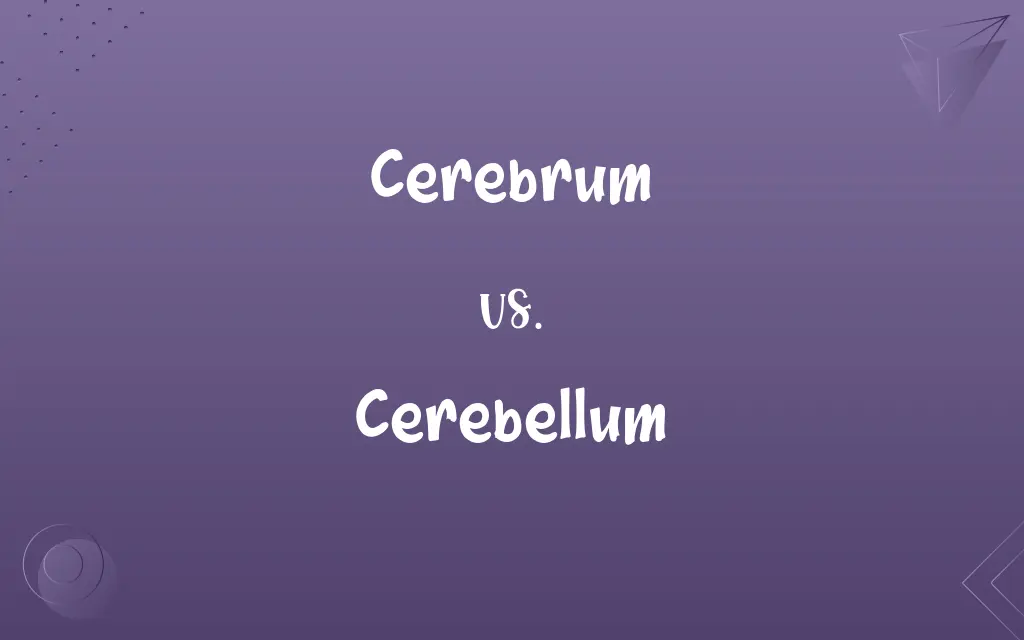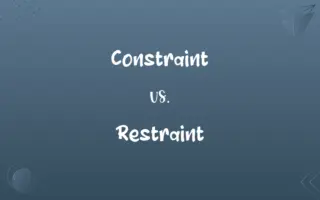Cerebrum vs. Cerebellum: Know the Difference

By Shumaila Saeed || Updated on December 25, 2023
The cerebrum is the largest brain part, responsible for higher brain functions, while the cerebellum is smaller, coordinating movement and balance.

Key Differences
The cerebrum, the brain's largest part, handles complex cognitive tasks, whereas the cerebellum, located under the cerebrum, primarily manages motor control and coordination.
Shumaila Saeed
Nov 15, 2023
In the cerebrum, functions like thought, memory, and decision-making are processed, contrasting with the cerebellum's role in fine-tuning movements, balance, and posture.
Shumaila Saeed
Nov 15, 2023
The cerebrum's two hemispheres control opposite sides of the body, while the cerebellum's hemispheres control the same side, indicating distinct neural wiring and function.
Shumaila Saeed
Nov 15, 2023
Emotional processing and sensory interpretation occur in the cerebrum, whereas the cerebellum integrates sensory input with motor commands, ensuring smooth, coordinated movements.
Shumaila Saeed
Nov 15, 2023
Language, abstract thinking, and problem-solving are cerebrum functions, while the cerebellum is essential for tasks requiring precision, like playing a musical instrument or athletic activities.
Shumaila Saeed
Nov 15, 2023
ADVERTISEMENT
Comparison Chart
Function
Higher cognitive functions, emotions, sensory processing
Movement coordination, balance, posture
Shumaila Saeed
Nov 15, 2023
Location
Upper part of the brain
Underneath the cerebrum, towards the back of the skull
Shumaila Saeed
Nov 15, 2023
Control
Contralateral (opposite side of the body)
Ipsilateral (same side of the body)
Shumaila Saeed
Nov 15, 2023
Role in Movement
Not directly involved
Directly involved in fine-tuning and coordination
Shumaila Saeed
Nov 15, 2023
ADVERTISEMENT
Cerebrum and Cerebellum Definitions
Cerebrum
The upper, larger part of the brain responsible for cognitive functions.
The cerebrum plays a crucial role in our ability to think and reason.
Shumaila Saeed
Nov 15, 2023
Cerebellum
A brain part responsible for coordinating movement and balance.
The cerebellum helps us to walk smoothly without falling.
Shumaila Saeed
Nov 15, 2023
Cerebrum
A brain area associated with emotion and learning.
The cerebrum is active when we experience emotions like happiness or sadness.
Shumaila Saeed
Nov 15, 2023
Cerebellum
A small, lower brain region contributing to motor learning.
Learning to ride a bike involves the cerebellum's motor learning functions.
Shumaila Saeed
Nov 15, 2023
Cerebrum
The part of the brain where memories are formed and stored.
Her cerebrum held the precious memories of her childhood.
Shumaila Saeed
Nov 15, 2023
ADVERTISEMENT
Cerebellum
The brain region that refines motor movements.
Skilled athletes have a highly developed cerebellum for precise movements.
Shumaila Saeed
Nov 15, 2023
Cerebrum
The brain's section controlling voluntary movements.
The cerebrum enables us to perform complex tasks like playing the piano.
Shumaila Saeed
Nov 15, 2023
Cerebellum
The part of the brain that adjusts muscle activity.
The cerebellum plays a key role in maintaining posture and equilibrium.
Shumaila Saeed
Nov 15, 2023
Cerebrum
The brain region involved in processing sensory information.
The cerebrum interprets signals from our eyes, enabling us to see.
Shumaila Saeed
Nov 15, 2023
Cerebellum
The brain's section involved in non-motor functions like attention.
The cerebellum also contributes to cognitive processes like focusing attention.
Shumaila Saeed
Nov 15, 2023
Cerebrum
The large rounded structure of the brain occupying most of the cranial cavity, divided into two cerebral hemispheres that are joined at the bottom by the corpus callosum. It controls and integrates motor, sensory, and higher mental functions, such as thought, reason, emotion, and memory.
Shumaila Saeed
Oct 19, 2023
Cerebellum
The trilobed structure of the brain, lying posterior to the pons and medulla oblongata and inferior to the occipital lobes of the cerebral hemispheres, that is responsible for the regulation and coordination of complex voluntary muscular movement as well as the maintenance of posture and balance.
Shumaila Saeed
Oct 19, 2023
Cerebrum
(neuroanatomy) The principal and most anterior part of the brain in vertebrates, which is located in the front area of the skull and divided into two hemispheres, left and right, separated by a fissure. In humans it is the largest part of the brain and is responsible for the integration of complex sensory functions and the initiation and coordination of voluntary activity, and the higher mental functions such as consciousness, thought, reason, emotion, and memory.
Shumaila Saeed
Oct 19, 2023
Cerebellum
(neuroanatomy) Part of the hindbrain in vertebrates. In humans it lies between the brainstem and the back of the cerebrum and is formed of two lateral lobes and a median lobe. It plays an important role in sensory perception, motor output, balance and posture.
Shumaila Saeed
Oct 19, 2023
Cerebrum
The anterior, and in man the larger, division of the brain; the seat of the reasoning faculties and the will. See Brain.
Shumaila Saeed
Oct 19, 2023
Cerebellum
The large lobe of the hind brain in front of and above the medulla; the little brain. It controls combined muscular action. See Brain.
Shumaila Saeed
Oct 19, 2023
Cerebrum
Anterior portion of the brain consisting of two hemispheres; dominant part of the brain in humans
Shumaila Saeed
Oct 19, 2023
Cerebellum
A major division of the vertebrate brain; situated above the medulla oblongata and beneath the cerebrum in humans
Shumaila Saeed
Oct 19, 2023
Repeatedly Asked Queries
Does the cerebrum process sensory information?
Yes, it's involved in processing sensory input from various body parts.
Shumaila Saeed
Nov 15, 2023
Can the cerebellum affect cognitive functions?
Yes, besides motor control, it also plays a role in cognitive processes.
Shumaila Saeed
Nov 15, 2023
Is the cerebellum important for learning new movements?
Yes, it's crucial for motor learning and refining movements.
Shumaila Saeed
Nov 15, 2023
What does the cerebellum primarily control?
It controls movement coordination, balance, and posture.
Shumaila Saeed
Nov 15, 2023
What is the primary role of the cerebrum?
It's responsible for cognitive functions, including thinking, memory, and decision-making.
Shumaila Saeed
Nov 15, 2023
Is the cerebrum larger than the cerebellum?
Yes, the cerebrum is the largest part of the brain.
Shumaila Saeed
Nov 15, 2023
Is the cerebrum involved in language processing?
Yes, particularly the left hemisphere in most people.
Shumaila Saeed
Nov 15, 2023
Can the cerebellum influence emotional responses?
Indirectly, as it integrates sensory and motor functions which can impact emotions.
Shumaila Saeed
Nov 15, 2023
Does the cerebrum control voluntary or involuntary actions?
The cerebrum controls voluntary actions.
Shumaila Saeed
Nov 15, 2023
What is the role of the cerebrum in memory formation?
It's crucial for creating, storing, and retrieving memories.
Shumaila Saeed
Nov 15, 2023
Can damage to the cerebellum affect movement?
Yes, it can lead to coordination and balance problems.
Shumaila Saeed
Nov 15, 2023
Do the cerebrum and cerebellum work independently?
No, they interact closely to ensure smooth and coordinated bodily functions.
Shumaila Saeed
Nov 15, 2023
Which part of the brain is involved in emotional processing?
The cerebrum, particularly the limbic system within it.
Shumaila Saeed
Nov 15, 2023
Does the cerebellum have a role in spatial perception?
Yes, it contributes to understanding and navigating spatial environments.
Shumaila Saeed
Nov 15, 2023
Are both hemispheres of the cerebrum equally important?
Yes, each hemisphere has specific functions but they work together.
Shumaila Saeed
Nov 15, 2023
What happens if the cerebellum is damaged?
It can result in difficulties with coordination, precision, and timing of movements.
Shumaila Saeed
Nov 15, 2023
Can the cerebrum be affected by mental health conditions?
Yes, conditions like depression and anxiety can affect cerebrum function.
Shumaila Saeed
Nov 15, 2023
Is the cerebellum essential for everyday activities?
Yes, for activities that require coordination and balance.
Shumaila Saeed
Nov 15, 2023
How does the cerebrum contribute to problem-solving?
It's involved in reasoning, planning, and abstract thinking.
Shumaila Saeed
Nov 15, 2023
Does aging affect the cerebrum and cerebellum differently?
Yes, both can be affected, but the impact and symptoms may vary.
Shumaila Saeed
Nov 15, 2023
Share this page
Link for your blog / website
HTML
Link to share via messenger
About Author
Written by
Shumaila SaeedShumaila Saeed, an expert content creator with 6 years of experience, specializes in distilling complex topics into easily digestible comparisons, shining a light on the nuances that both inform and educate readers with clarity and accuracy.








































































